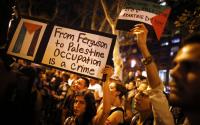Common Dreams / Published on Monday, December 27, 2004 by the Los Angeles Times Ronald Brownstein |
Millions of Americans probably learned about last week's horrific attack on U.S. troops in Mosul while wrapping Christmas presents or stuffing packages into the SUV after a last-minute shopping blitz at the mall. That jarring juxtaposition may be the perfect symbol for the Iraq war. This grueling, grinding conflict is skittering through American life like a tornado that tears one house to the ground in every neighborhood, while leaving all those around it unscratched. For the military personnel on the front lines — and their families and friends — the war is exacting bitter costs. For all other Americans, even for the officials whose decisions sent the troops into battle and shaped the conditions under which they are fighting and dying, the war is imposing no discernible consequences. Like the Civil War, when a rich draftee in the North could hire a poor man to take his place, and Vietnam with its loophole-ridden draft, the Iraq war risks being stained by systemic inequity. Soldiers tend to salute not complain, but this war is straining the military so much that "volunteer service" may no longer precisely describe it. Ordinarily, the Pentagon limits each soldier to one overseas deployment every four or five years. But nearly one-third of the roughly 1 million U.S. troops who have fought in Afghanistan and Iraq have been forced to serve more than one tour of combat duty, the Boston Globe reported last month. Thousands of additional soldiers have seen their tours involuntarily extended through "stop loss" policies that prevent them from leaving the military when they complete their commitment. Reserve and National Guard units accustomed to domestic responsibilities have been placed on extended duty in Iraq. U.S. troops are facing relentless violence in a war in which progress has proved as elusive as the enemy itself. Each death and injury tears a hole in a circle of family and friends. Meanwhile, for everyone else in America, the war is proceeding without a cost greater than their unease and sorrow when watching the evening news. Since the Civil War, Americans have raised taxes to fund all of the nation's wars. But when Congress returns next month, one of President Bush's first priorities will be legislation making permanent the huge tax cuts he won during his first term. Bush's presidency marks the first time the U.S. has significantly cut taxes while at war. Since the federal budget is already in deficit, that means we are effectively passing the bill for this war onto our children through an increased national debt. The war's political consequences are unfolding in a comparable spirit of buck passing. Wars always surprise their planners. But even setting aside the debate over whether the threat from Saddam Hussein merited the invasion of Iraq, it's clear this war has been complicated by an unusual concentration of mistakes and misjudgments. The weapons of mass destruction that provided the central justification for the invasion have never been found, and by the best calculation of the CIA, no longer existed. Foreign countries the Bush administration assumed would fall into line after the U.S. moved against Iraq instead refused to provide meaningful help. And after a brilliant campaign against the conventional Iraqi military, the Pentagon has appeared to be blindsided by the persistence and ferocity of the unconventional resistance that followed the fall of Baghdad. In June 2003, Defense Secretary Donald H. Rumsfeld dismissed the Iraqi insurgency as mere "pockets of dead-enders." Eighteen months later, U.S. soldiers and Iraqi citizens are still dying in large numbers at the hands of those "dead-enders." And the failure to fully plan for the insurgency is still being felt in what many experts consider shortages of combat troops and appropriate supplies (such as armored vehicles). Yet the only senior administration official who faced any consequences over the Iraq war has been the most prominent skeptic, outgoing Secretary of State Colin L. Powell, who was politely but firmly shown the door after Bush's reelection. Bush this month awarded the nation's highest civilian honor, the Presidential Medal of Freedom, to three architects of the war: former CIA Director George J. Tenet, retired Army Gen. Tommy Franks and L. Paul Bremer III, the former top civilian administrator in Iraq. Bush promoted Condoleezza Rice, his national security advisor, to replace Powell. And the president has unwaveringly defended Rumsfeld, even amid calls from Republicans and conservative activists for his resignation. Each of these officials has served the nation with dedication (if varying results) under difficult circumstances. Yet by honoring and defending them so lavishly while Iraq remains engulfed in violence, Bush seems to be absolving them, and himself, of any responsibility for the chaos. Like his tax cuts, Bush's personnel decisions are sending the unfortunate message that no one apart from the soldiers on the ground and their families should pay any price for this war. If the cause in Iraq is as vital as Bush insists, all Americans should contribute. Through countless acts of individual generosity, Americans have demonstrated their desire to support the troops; it's unlikely they would rebel if Congress repealed some of Bush's tax cuts in order to fund the war. Restoring accountability for policy makers is trickier. The clamor about Rumsfeld overly personalizes fault for an Iraq strategy that Bush had approved; the president bears the ultimate responsibility to find a path with a better prospect of success at a cost America will accept. Still, Bush is leaving a dangerous impression that on Iraq he values loyalty more than performance. A conspicuous administration shake-up that labels and punishes failure might offer the president his best chance to prompt fresh thinking — if he wants to hear it. |






